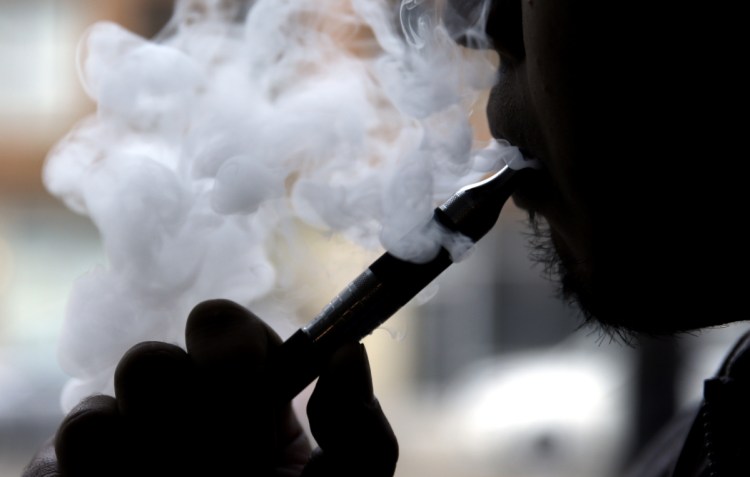WASHINGTON — The Food and Drug Administration on Thursday launched a multipronged attack on the rising underage use of tobacco products, imposing sharp sales restrictions on flavored e-cigarettes and announcing plans to ban menthol cigarettes and flavored cigars.
The FDA says it will limit sales of many flavored e-cigarettes to bricks-and-mortar outlets that have either age-restricted entry or areas inside stores that are not accessible to people under 18. Such restrictions are tantamount to a ban for many convenience stores and gas stations but not for specialty vape and tobacco stores, a top agency official said. The FDA also will require stepped-up age verification for online sales.
The new limits reflect health experts’ concerns that e-cigarette use could lead to nicotine addiction early in life and affect the developing adolescent brain and that some e-cigarette users will go on to smoke more dangerous regular cigarettes.
SURGE IN USE AMONG MINORS
Perhaps even more significant than the e-cigarette steps are the FDA’s commitments to propose bans on menthol in cigarettes and cigars, as well as other flavors in cigars. Such prohibitions will require new regulations that could take years to go into effect, and could be derailed by opposition from the cigarette industry. If successful, though, the bans could have an especially significant impact on African American adults and youth, who smoke menthol cigarettes and flavored cigars at higher rates than other groups.
The tobacco blueprint was released by FDA Commissioner Scott Gottlieb as the government published new data showing a surge in e-cigarette use among minors.
The 2018 National Youth Tobacco Survey, by the FDA and the Centers for Disease Control and Prevention, found that vaping had increased 78 percent among high school students since last year and almost 48 percent among middle schoolers; 3.6 million youngsters reported vaping at least once in the previous 30 days.
Especially concerning to officials was a sharp rise in regular use. Almost 28 percent of high school vapers said they used e-cigarettes at least 20 days a month, and most used flavored products.
FDA COULD FACE LAWSUIT
“The bottom line is this: I will not allow a generation of children to become addicted to nicotine through e-cigarettes,” Gottlieb said in a statement. “We won’t let this pool of kids, a pool of future potential smokers, to continue to build.” He said the new policy was designed to get to the “core” of the issue – flavored nicotine products, often in fruity, sweet and creamy flavors, that appeal to kids. The restrictions do not affect mint, menthol and tobacco flavored e-cigarette products.
Gottlieb called on companies to remove the affected products within 90 days from stores that children can enter and from online sites that don’t have adequate age-verification procedures.
The FDA’s moves on menthol cigarettes and flavored cigars drew widespread praise even before they were officially announced. Its actions on e-cigarettes were more controversial. Public health experts called them a start but said they were not a comprehensive solution to the problem, while vaping advocates said they would hurt adult smokers using e-cigarettes to quit.
“The proposal to prohibit the sale of menthol cigarettes and flavored cigars has the potential to have a greater impact on youth tobacco use and tobacco use among African Americans than any regulatory measure ever undertaken by the federal government,” said Matt Myers, president of the Campaign for Tobacco-Free Kids. But he added that the e-cigarette actions “fall short of what’s needed.”
Robin Koval, chief executive of Truth Initiative, a tobacco-control group, also praised the planned bans, but said it was a mistake to exempt mint and menthol e-cigarettes from sales restrictions, given that data shows those flavors are becoming increasingly popular among high schoolers.
But Gottlieb insisted that the exclusion of mint and menthol reflected a “careful balancing” of concerns about youth and the needs of adult smokers using e-cigarettes to quite smoking. And he said he would consider restricting those flavors if youth use didn’t decline.
Some critics raised the possibility that the agency could face a lawsuit by trying, in effect, to limit vaping product sales to certain types of stores.
“I don’t think they know where the law allows the FDA to ban hundreds of thousands of stores from selling a legal product,” said Lyle Beckwith, senior vice president of the National Association of Convenience Stores.
On the menthol issue, the 2009 tobacco-control act banned all flavors in traditional cigarettes except menthol; that was left for the FDA to tackle. But the agency never sought to bar menthol cigarettes, which over the years have been marketed heavily to African Americans.
A big-selling menthol cigarette is Newport, by Reynolds American, a subsidiary of British American Tobacco.
Black organizations late Wednesday applauded the idea of a menthol ban, noting that almost 90 percent of African American smokers choose menthols.
Health and Human Services Secretary Alex Azar signaled his support for the FDA.
Copy the Story LinkSend questions/comments to the editors.



Success. Please wait for the page to reload. If the page does not reload within 5 seconds, please refresh the page.
Enter your email and password to access comments.
Hi, to comment on stories you must . This profile is in addition to your subscription and website login.
Already have a commenting profile? .
Invalid username/password.
Please check your email to confirm and complete your registration.
Only subscribers are eligible to post comments. Please subscribe or login first for digital access. Here’s why.
Use the form below to reset your password. When you've submitted your account email, we will send an email with a reset code.